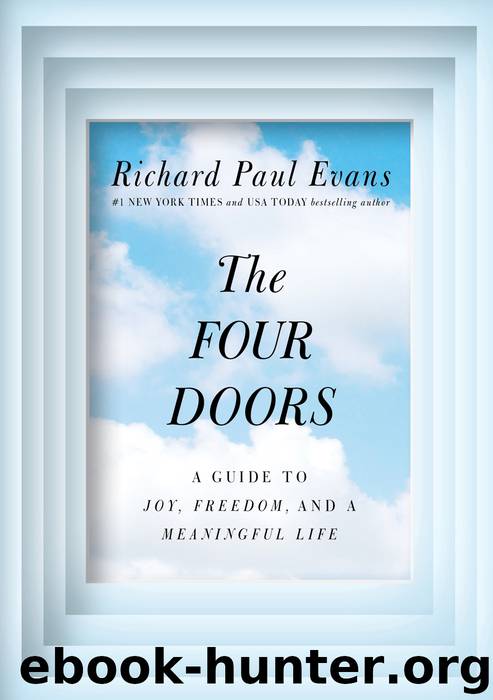The Four Doors by Richard Paul Evans

Author:Richard Paul Evans
Language: eng
Format: epub
Publisher: Simon & Schuster
The Justice of Self-Forgiveness
Many times the most difficult individual to forgive is yourself. In a bizarre act of injustice, we try ourselves over and over for the same crime. There’s a legal term for this: double jeopardy. And it was considered to be an act of such injustice that the founding fathers specifically added it as the Fifth Amendment of the Constitution.
“[N]or shall any person be subject for the same offense to be twice put in jeopardy of life or limb . . . ”
The goal of the double jeopardy amendment is to avoid a retrial after an acquittal or a conviction, and multiple punishments for the same crime.
Yet that is precisely what we do to ourselves. We try ourselves over and over for the same offense, then inflict repeated punishments of self-hate, guilt, and rejection. This is wholly unjust and ethically wrong.
There is nothing wrong with feeling guilt for the things we do wrong. But once we have identified and confessed our mistake and, if possible, tried to make amends for it, the just and honest thing to do is to let it go. We all make mistakes. Holding on to past wrongs is as foolish as a basketball player perseverating over a missed shot in a previous game. It not only distracts from the current game but increases the chance of repeating the mistake.
As if justice wasn’t already enough of a reason, there is another important reason for self-forgiveness. Oftentimes we specifically attack others for the crimes we are unable to forgive in ourselves. Therefore, the act of forgiving ourselves opens us up to the possibility of forgiving others.
Here are two exercises to help you mentally overcome the anguish of personally inflicted double jeopardy.
First, the next time a thought of self-incrimination pops into your mind over something you’ve already suffered for, call it out. Identify the exact offense, when it took place, and how many times you’ve punished yourself for the error. (You may have to estimate—the number may be in the hundreds or thousands.) Then say to yourself, “I know that I did wrong, but I’ve already paid for my mistake. Punishing myself over and over for what I’ve already suffered is unjust to me and God. I hereby finally forgive myself and let it go forever.”
The thought may come again, but it will be weaker the next time. Call it out each time it comes until it completely vanishes.
Second, if you are still dealing with a recent indiscretion and doing your best to make amends, then try repeating this mantra until you feel peace:
I have done wrong,
I confess it to Thee.
I seek Thy correction,
To be more like Thee.
While these techniques have worked powerfully for me, you might want to create your own ritual, such as visualizing your wrongdoing as a balloon and letting it go, or lighting a candle and blowing it out, etc.
The important thing is the recognition of the injustice of self-inflicted double jeopardy and ending the mental loop that continues to bring you pain.
Download
This site does not store any files on its server. We only index and link to content provided by other sites. Please contact the content providers to delete copyright contents if any and email us, we'll remove relevant links or contents immediately.
Fangirl by Rainbow Rowell(7842)
How to Bang a Billionaire by Alexis Hall(7415)
Wonder by R. J. Palacio(7077)
The Space Between by Michelle L. Teichman(6095)
The Thirst by Nesbo Jo(5791)
Assassin’s Fate by Robin Hobb(5251)
Wiseguy by Nicholas Pileggi(4598)
The Kite Runner by Khaled Hosseini(4466)
The Night Circus by Erin Morgenstern(4430)
Bittersweet (True North #1) by Sarina Bowen(4339)
Paper Towns by Green John(4175)
Gerald's Game by Stephen King(3925)
Too Much and Not the Mood by Durga Chew-Bose(3698)
Pillow Thoughts by Courtney Peppernell(3412)
Twelve Days of Christmas by Debbie Macomber(3027)
Goodbye Paradise(2973)
Good by S. Walden(2920)
The Rosie Effect by Graeme Simsion(2714)
After We Fell by Anna Todd(2659)
